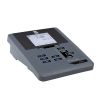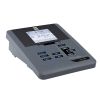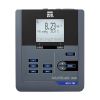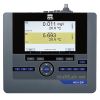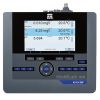YSI TruLab pH 1110 Benchtop Meter
Features
- Single channel measurement of pH or mV (ORP) and temperature
- AutoRead function improves repeatability
- Wide selection of electrodes - pH, ORP and temperature probes
- Free ground shipping
- Expedited repair and warranty service
- Lifetime technical support
- More
Overview
The YSI TruLab pH 1110 benchtop meter is the ideal laboratory instrument for basic, routine measurements in the lab. The YSI TruLab pH1110 is an accurate, easy-to-use solution for repeatable pH or mV measurements in the laboratory.
Reliable and Efficient
The YSI TruLab pH 1110 benchtop meter's AutoRead function indicates when a stable measurement is reached, improving repeatability. An adjustable timer indicates when to perform the next calibration routine, improving measurement accuracy.
Benefits
- Single channel measurement of pH or mV (ORP) and temperature.
- Easy-to-read large, segmented display for pH, mV (ORP) and temperature
- Automatic or manual temperature compensation
- 1, 2 or 3-point calibration
- BNC connection for pH, mV; 2 banana connections: 1 for an external temperature sensor and 1 for external reference if using a half cell
- 3-year warranty
- Wide selection of electrodes - pH, ORP and temperature probes
- (1) TruLab pH 1110 benchtop meter
- (1) Universal AC power supply
- (1) Electrode stand
In The News
Beaufort Sea study seeks to prospect and protect complex Arctic ecosystem
The Arctic has become the target of some ironic attention lately. While part of the international community eyes the region as a climate change indicator, many other entities have set their gaze on the oil and gas reserves that could fuel such change. Now a collaboration between federal and private sector organizations, as well as U.S. and Canadian scientists, seeks to uncover the workings of the Arctic Beaufort Sea ecosystem so that its potential for human use is understood alongside the requirements for its protection. Being the federal agency responsible for offshore energy development, the Bureau of Ocean Energy Management is leading the Marine Arctic Ecosystem Study with help from the other nine members of the National Oceanographic Partnership Program.
Read MoreNew Rotorua Te Arawa Lakes data buoy tracks polymictic lake’s oxygen dynamics
A new data buoy launched this year in New Zealand’s Lake Rerewhakaaitu is providing scientists with insights into the polymictic lake’s oxygen dynamics and water column production. Polymictic lakes turn over many times per year. The next-generation profiler is overseen by the Rotorua Te Arawa Lakes Programme and uses an automated winch to raise and lower sensors on a regular basis. “The winch allows us to use a single package of water quality instruments to measure multiple depths through the water column,” said Chris McBride, technician at the University of Waikato who is helping the RTA Lakes Programme oversee the buoy.
Read MoreIndigo V research expedition proves potential for citizen-powered oceanography
From the heart of European cities, to protected coastal habitats, and even the ground beneath our feet, citizen scientists have shown time after time that, with a little professional guidance, they’re more than capable of gathering scientific data for any number of applications. Last year, a research expedition aboard a standard sailing yacht raised hopes that sailors across the world could help scientists monitor the seas on the cheap. “I’ve been a sailor my whole life,” said Federico Lauro, microbiologist at University of New South Wales and the research expedition’s scientific leader. “My father, Giorgio Lauro, was a judge for the America’s Cup, Louis Vuitton Cup, and the Olympics just to name a few.
Read More

















